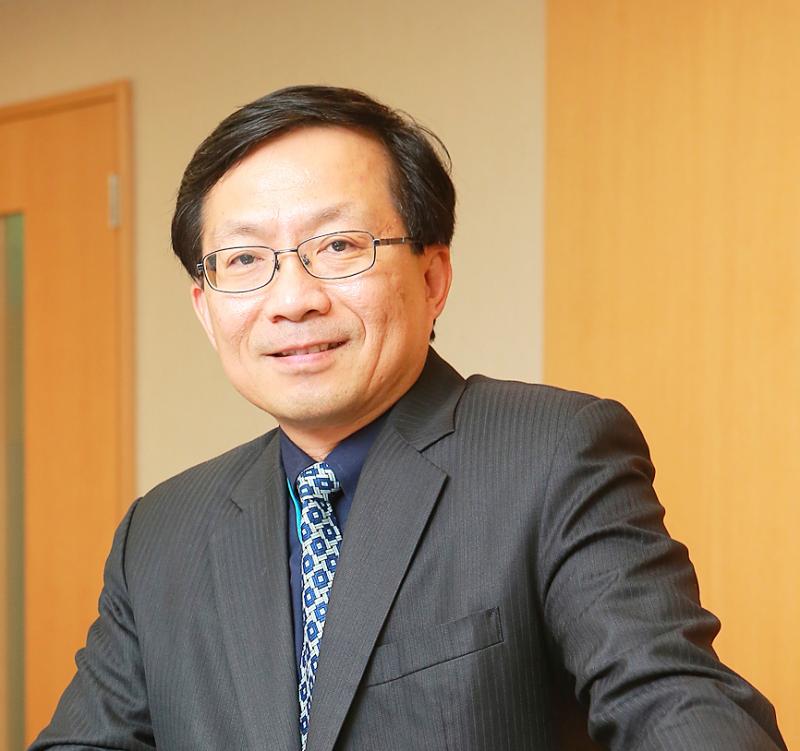About 70 percent of businesses in the manufacturing and service sectors have been negatively affected by a local COVID-19 outbreak that started in May, but the impact is “manageable,” the Industrial Technology Research Institute (ITRI, 工研院) said in a report yesterday.
The report, prepared with the help of industrial and trade organizations, surveyed Taiwanese businesses last month and this month during a nationwide level 3 COVID-19 alert, with 52.2 percent of respondents saying that pandemic restrictions in the workplace or working from home affected their productivity.
Manufacturers were most concerned about logistics difficulties caused by the pandemic, with container ships stuck at foreign ports or simply unavailable, it said.

Photo courtesy of Industrial Technology Research Institute
Had the level 3 alert continued until the end of the year, 50.2 percent of the polled manufacturers said they would have faced components and raw material shortages, it said.
The components shortage “is not just due to level 3 controls, but also stems from the reshuffling of global supply chains,” it said.
Companies in the service sector were hit harder by decreased business, with 39.3 percent saying they have seen significantly reduced orders and 38.6 percent reporting modestly reduced orders, while 8.8 percent reported higher orders due to pandemic-related demand.
However, 4.3 percent said they had suspended operations due to the pandemic.
“The biggest concern of businesses is the smooth and swift administration of vaccines,” the report said.
About 80 percent of respondents said vaccination was a “pressing concern,” it said.
The pandemic should hasten efforts to facilitate the digital transformation of Taiwanese businesses to boost the resilience of Taiwanese supply chains, said Stephen Su (蘇孟宗), vice president and general director of Industry, Science and Technology International Strategy Center at ITRI.
“We had expected a 10-year timeline for the digital transformation of Taiwanese businesses, but in the wake of ‘black swan’ events like COVID-19, that needs to be brought forward,” Su said. “We need to strengthen Taiwanese supply chains so we can keep our key position in the greater global supply chain.”
“It is no longer good enough to simply chase the lowest costs. A more well-distributed supply chain and the ability of businesses to continue operating online would help Taiwanese businesses keep operating in case of unexpected events,” he said.

MULTIFACETED: A task force has analyzed possible scenarios and created responses to assist domestic industries in dealing with US tariffs, the economics minister said The Executive Yuan is tomorrow to announce countermeasures to US President Donald Trump’s planned reciprocal tariffs, although the details of the plan would not be made public until Monday next week, Minister of Economic Affairs J.W. Kuo (郭智輝) said yesterday. The Cabinet established an economic and trade task force in November last year to deal with US trade and tariff related issues, Kuo told reporters outside the legislature in Taipei. The task force has been analyzing and evaluating all kinds of scenarios to identify suitable responses and determine how best to assist domestic industries in managing the effects of Trump’s tariffs, he

TIGHT-LIPPED: UMC said it had no merger plans at the moment, after Nikkei Asia reported that the firm and GlobalFoundries were considering restarting merger talks United Microelectronics Corp (UMC, 聯電), the world’s No. 4 contract chipmaker, yesterday launched a new US$5 billion 12-inch chip factory in Singapore as part of its latest effort to diversify its manufacturing footprint amid growing geopolitical risks. The new factory, adjacent to UMC’s existing Singapore fab in the Pasir Res Wafer Fab Park, is scheduled to enter volume production next year, utilizing mature 22-nanometer and 28-nanometer process technologies, UMC said in a statement. The company plans to invest US$5 billion during the first phase of the new fab, which would have an installed capacity of 30,000 12-inch wafers per month, it said. The

Taiwan’s official purchasing managers’ index (PMI) last month rose 0.2 percentage points to 54.2, in a second consecutive month of expansion, thanks to front-loading demand intended to avoid potential US tariff hikes, the Chung-Hua Institution for Economic Research (CIER, 中華經濟研究院) said yesterday. While short-term demand appeared robust, uncertainties rose due to US President Donald Trump’s unpredictable trade policy, CIER president Lien Hsien-ming (連賢明) told a news conference in Taipei. Taiwan’s economy this year would be characterized by high-level fluctuations and the volatility would be wilder than most expect, Lien said Demand for electronics, particularly semiconductors, continues to benefit from US technology giants’ effort

‘SWASTICAR’: Tesla CEO Elon Musk’s close association with Donald Trump has prompted opponents to brand him a ‘Nazi’ and resulted in a dramatic drop in sales Demonstrators descended on Tesla Inc dealerships across the US, and in Europe and Canada on Saturday to protest company chief Elon Musk, who has amassed extraordinary power as a top adviser to US President Donald Trump. Waving signs with messages such as “Musk is stealing our money” and “Reclaim our country,” the protests largely took place peacefully following fiery episodes of vandalism on Tesla vehicles, dealerships and other facilities in recent weeks that US officials have denounced as terrorism. Hundreds rallied on Saturday outside the Tesla dealership in Manhattan. Some blasted Musk, the world’s richest man, while others demanded the shuttering of his